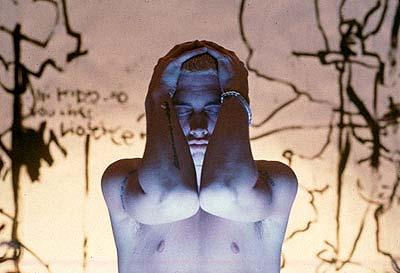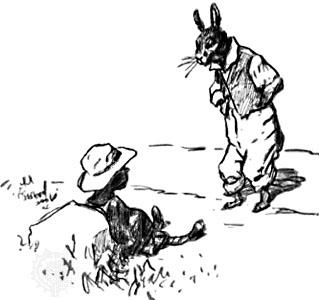 And why do we hear such criticism of Eminem and not of other voices of sexism and
homophobia in our society? How many of those who criticize Eminem support same-sex
marriage or the Equal Rights Amendment? How many read all
of his lyrics, including the ones about depression (
If I could swallow a bottle of Tylenol I would/and end it for good/just say goodbye
to Hollywood"),
resisting violent tendencies (What I did was stupid, no doubt it was dumb/
But the smartest shit I did was take the bullets outta that gun) class struggle (
Going through public housing systems), fatherhood (I think I'm bottomin'
out, but I'm not about to give up/I gotta get up, thank God, I got a little girl/and
I'm a responsible father, so not a lot of good/I'd be to my daughter, layin' in the
bottom of the mud), and the rest?
And why do we hear such criticism of Eminem and not of other voices of sexism and
homophobia in our society? How many of those who criticize Eminem support same-sex
marriage or the Equal Rights Amendment? How many read all
of his lyrics, including the ones about depression (
If I could swallow a bottle of Tylenol I would/and end it for good/just say goodbye
to Hollywood"),
resisting violent tendencies (What I did was stupid, no doubt it was dumb/
But the smartest shit I did was take the bullets outta that gun) class struggle (
Going through public housing systems), fatherhood (I think I'm bottomin'
out, but I'm not about to give up/I gotta get up, thank God, I got a little girl/and
I'm a responsible father, so not a lot of good/I'd be to my daughter, layin' in the
bottom of the mud), and the rest?
Like the critics of Explicit Lyrics labels (which are always put on rap albums, but curiously omitted on many heavy metal ones), Eminem asks an old question, but one still unanswered: why it is OK to let kids see the latest Schwarzenegger bloodbath in which the brutal action is accompanied by Neanderthal dialogue, but not OK to let them hear the complex and articulate anger of multi-layered rap?
Answer: Because the violence of Schwartzenegger (soon to be the Republican nominee for governor of California) is somehow apolitical - which is to say, it has conservative politics. Schwartznegger's violence ignores social problems. It 'blows off steam' -- steam that could be used for remedying injustice -- at nothing in particular, or at an outrageous/otherworldly "bad guy." For all its bluster, Schwartznegger violence preserves (not threatens) the status quo. So when Arnie lobs a grenade, it's treated as if it were a cartoon; when Spike Lee throws a garbage can, it's incitement to riot.
And again, what is important about Eminem as a white hip-hop artist is that he's
shown that it's not just (or even primarily) Spike Lee's race that matters - it's
his class too. But such a degree of engagement, even an engagement as egocentric as Eminem's, is already dangerous to the vested interests at the top of the slope. And so expression that we might take for granted if it was coming from a homophobic politician, or an Action-hero goon, is suddenly perceived as a threat.

5. "B'rer Rabbit, He Lay Low": What's next?
Future, Rabbit's best friend in 8 Mile (played by Mekhi Phifer of Clockers fame) says that B. Rabbit got his name because "he runs fast and likes to screw a lot." His mother says it's because he had big ears and buckteeth. Yet for a group of people as in tune with cultural and racial narratives as rappers, the name has a more obvious connotation: Brer Rabbit, who outsmarts everyone around the Briar Patch in which he was born and bred. Jimmy is brought up very much in the Briar Patch, and the environment teaches him how to be smart. He knows his Uncle Remus tales as well as, if not better than, his friends.
The fact that 8 Mile has already begun to soften his image is proof that Eminem has climbed out of the Briar Patch and has begun to recognize how he sounds to the wider world. He faces new challenges - not the least being how to represent the working class with millions in the bank and Grammys on the mantelpiece. But Eminem stands at a moment of opportunity. America, disengaged politically but ready to be entertained, is listening, and Eminem has an important message to bring them - if he has the courage. He says he is
The ringleader of the circus of worthless pawns
Sent to lead the march right up to the steps of Congress
And piss on the lawns of the White House
To burn the casket and replace it with a parental advisory sticker
To spit liquor in the faces of this democracy of hypocrisy
Fuck you Ms. Cheney
Fuck you Tipper Gore
Will he do it? Having blown up an image of Dick Cheney in a video, can Eminem 'blow him off the spot' for real?

Dan Friedman is film editor of Zeek. Jay Michaelson also contributed to this article.
How to be Spike Lee instead of another Clocker
October, 2002
What's wrong with Sheryl Crow's summer smash
October, 2002
The limited vision of Minority Report
August, 2002
Real life & real music from John Roderick & Co.
June, 2002
The personal politics of this summer's blockbusters.
June, 2002
CBS's packaging of the '9/11' documentary reveals exactly what America
fails to understand about September 11.
April, 2002
Mariah Carey? Bleagh! Where's the next Country Joe & the Fish to protest
the 'New War'?
March, 2002
Frederick Wiseman takes us inside the pervasive, sinister institution of
domestic violence.
March, 2002
I need the rock. But GOD I love Elton John.
January, 2002
Two related theories about Bob Dylan, or, a review of his November 19,
2001 show, in which divine revelation plays a significant role.
December, 2001



film politics music jay's head poetry art josh ring fysche saddies about archive